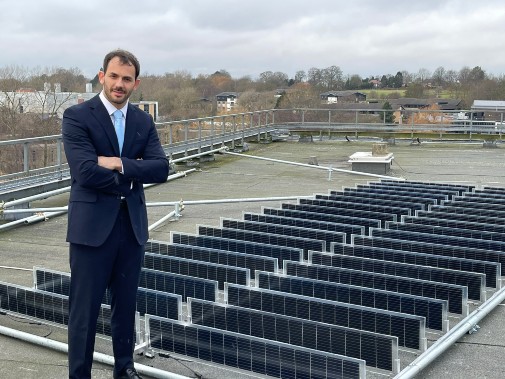Researchers are testing whether flat roof solar technology is as effective as panels currently used on pitched roofs.
 Dr Mahmoud Dhimish will be testing the technology from a campus building
Dr Mahmoud Dhimish will be testing the technology from a campus building
The panels have been installed on the flat roof of a University of York campus building, home to the School of Physics, Engineering and Technology, where researchers will be collecting data from the panels over the coming year.
Solar panels on flat roofs are currently not in use in the UK, but have been recently developed for testing by a Norwegian start-up company, Over Easy Solar. Researchers at the University will work with the company, with support from the Norwegian Research Council, to test the technology and collect data to see if it is suitable for the UK market.
Dust and birds
If successful the technology could replace the conventional solar panel setups, which is particularly important for flat roof, where currently racking systems and tilting the angle of the panels is needed to reduce dust accumulation and the damage caused by bird droppings.
Dust and bird droppings on solar panels can result in severe losses in the output of energy, and lead to problem 'hotspots' resulting in overheating. This is a particular problem for flat roof systems, but the proposed new panels have a 90 degree tilt, without the need for intrusive fasteners or heavy ballast.
More energy
Dr Mahmoud Dhimish, a Lecturer in Electrical Engineering at the School of Physics, Engineering and Technology, said: "It is believed this technology can generate more energy in the morning and evening when electricity prices are higher, as well as being easier to install than the traditional panels made for pitched roofs.
"We will be investigating whether this is indeed the case and whether the newly developed technology reduces energy losses from dust and bird droppings, making it less maintenance intensive. It is thought that the technology results in higher financial gain and suffers from fewer faults and defects, so all of these elements will be put to the test."
"This project is particularly timely as we face challenges in energy costs, and as we work towards milestones in achieving Net Zero, and so it is more important than ever that we collaborate with companies, such as Over Easy Solar, that are able to innovate in ways that contribute so positively towards these goals."
Domestic testing
A prototype of the technology has been tested in a domestic space in Norway, but this will be the first time installation and testing has taken place in the UK. Researchers are testing a 1.5kW system at York, equivalent to a domestic PV scale project, but the system is expandable and can be used for large-scale projects.
Trygve Mongstad, CEO and Founder of Over Easy Solar, said: "We started our first testing and prototyping in Norway in 2021, and it is now important for us to collect data from other climatic conditions to learn about the energy yield in different locations.
"The collaboration with the University of York is very valuable – we really appreciate the resources they dedicate to the project, and their eagerness to support and follow the development of innovative technology within solar energy."






